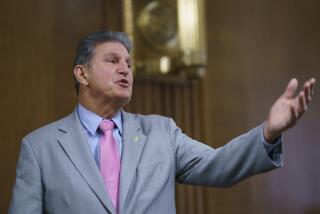Urge That Federal Subsidies Be Spared : Farmers Tell Economic Woes at Budget Hearing
- Share via
LANSING, Mich. — The Farmers Home Administration told him during the 1970s that he had two choices: expand his little Mason, Mich., hog farm, which was too small to be run efficiently, or liquidate it, Don Williams recalled here Monday.
So he borrowed and spent rather than give up his farm. Now, he told a House Budget Committee hearing, he owes $450,000--which is $244,000 more than the value of his entire farm--and is two years behind on his property taxes.
“There’s simply no way out of this if I don’t get some help,” he said. But he conceded that even if farm prices were to rise enough to make his business profitable and the government put a moratorium on farm foreclosures, “it would be up to my son to finish the debt off.”
Second of Six Hearings
Williams and other farmers testified before the committee in the second of six field hearings designed to “obtain the views of the American people on the deficit crisis that is facing our nation and the best means of tackling this serious problem,” Rep. Howard Wolpe (D-Mich.), who chaired the session, said.
House Democrats have said that they also hope the hearings will help convince Americans that President Reagan is responsible for a federal deficit that is approaching $230 billion and for painful cuts that will be needed to bring it under control.
In his fiscal 1986 budget, Reagan has proposed eliminating or sharply cutting a wide range of programs that have protected farm prices and provided agriculture financing. Like the urban officials who testified at Saturday’s hearing in New York City, the representatives of agriculture insisted that their federal subsidies should be spared as the budget ax falls.
Rep. Delbert L. Latta (R-Ohio), the Budget Committee’s ranking Republican, expressed impatience with the unwillingness of various interest groups to offer suggestions for cutting federal programs that affect them as a means of trimming the gaping deficit. “We want it to be the other fellow’s problem. . . . You’re looking at a problem that’s going to be everybody’s problem unless it’s solved,” he said.
Bad Advice Blamed
The farmers, state agriculture officials, economists and farm lenders blamed agriculture’s current economic problems on a variety of forces, including bad advice from government, overzealous expansion during the export binge of the last decade and the strong dollar, which makes farmers unable to compete in world markets they once ruled as it has increased the cost of American products abroad.
Neil Harl, a University of Iowa agricultural economist, told the panel that the problem is not a question of efficiency. “Some of the most efficient operators we have are in danger of becoming insolvent,” he said.
Although the Administration’s ultimate goal of weaning farmers from government programs is a good one, “the government has been nursemaid to the farmer a long time,” state Sen. Nick Smith, chairman of the Michigan Senate’s Agriculture Committee, said.
More to Read
Get the L.A. Times Politics newsletter
Deeply reported insights into legislation, politics and policy from Sacramento, Washington and beyond. In your inbox three times per week.
You may occasionally receive promotional content from the Los Angeles Times.










